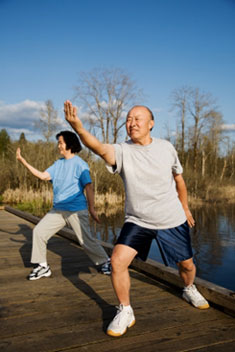Tai Chi and Your Knees
A new study shows the Chinese movements may alleviate osteoarthritis pain
By Peter Bendix

After 12 weeks, the group that practiced tai chi reported significant improvement in their knee pain compared to a control group. Photo: iStockphoto
Could tai chi be the answer to your knee pain?
Indeed it could, according to research by Chenchen Wang, an assistant professor at Tufts Medical School. Adults who practiced modified Yang-style tai chi—a variety of the ancient Chinese martial art that employs slow, flowing movements—found their knee pain caused by osteoarthritis improved.
Wang and her colleagues studied 40 adults, ages 55 and older, who reported knee problems due to osteoarthritis, a degenerative disease caused by abnormal wearing down of cartilage that cushions the joints. They divided the participants into two groups: one practiced Yang-style tai chi, and the other, a control group, received wellness education and did stretching exercises.
After 12 weeks, the group that practiced tai chi reported significant improvement in their knee pain, as well increased physical function, less depression and better health compared to the control group. Wang reported her findings at the annual meeting of the American College of Rheumatology in late October.
Wang said she believes tai chi could be beneficial for osteoarthritis because the exercise is known to have both physical and mental benefits, and thus could help alleviate pain and the emotional anguish that accompanies it.
While her pilot study had a relatively small sample size, Wang says she is pursuing more detailed research about the health benefits of tai chi.
Peter Bendix, A08, is an editorial assistant in the Office of Publications. He can be reached at peter.bendix@tufts.edu.


